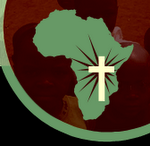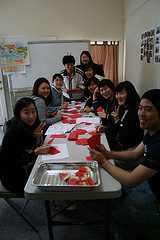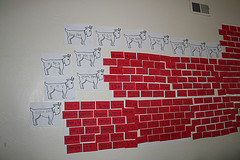Tuesday, June 24, 2008
Awsome team work!
So many people bought goats and bricks. Thank you everyone. You have encouraged us and motivated us to work harder in Rwanda.
Posted by
Come and See Africa
at
11:06 PM
0
comments
![]() Links to this post
Links to this post
Wednesday, June 11, 2008
Yosemite Fall
On June 2nd, our family went to Yosemite, and we took lots of photos. There will be a photo contest, each of us will enter 3 best pictures from this trip. Here are three of mine.
Originally uploaded by come and see africa
Posted by
Come and See Africa
at
12:29 PM
1 comments
![]() Links to this post
Links to this post
Sunday, May 25, 2008
All kinds of e-learning tools
At the Centre for Learning and Performance Technologies has been putting together a list of tools for e-learning. Here is the directory which you can spend hours and hours.
http://c4lpt.co.uk/Directory/index.html
Posted by
Come and See Africa
at
2:03 PM
0
comments
![]() Links to this post
Links to this post
Wednesday, May 21, 2008
Missing you, Mother
The day before Mother’s day, I saw her in the parking lot at the Bay Fair mall. An old Asian lady was stanidng by a car and waving her hand toward me. For a brief moment, I thought I saw my mother. The lady was waving to her daughter. I watched them embrace. I couldn’t hold back my tears any longer. Mother, I really miss you. It has been five years since you left us.
To My Mother
You taught me how to walk
Like a lady
In this world
On our monthly outing to the village market
I would hop and jump ahead of you
Hurrying to get to the bustling market place where
Vendors called to customers with their exotic wares
I was impatient with your measured walk
I would pull your skirts to hurry
Instead, you stopped in the middle of the road
Told me to look at those scurrying people
You whispered to me to watch how they walked
Pointing out how unbecoming
Like a grass hopper, when a woman sway her hip and shoulder
Like a duck, when a woman walk her feet pointing outward
Then you showed me the proper way to walk
“Take your step one foot over another as though you are walking on a rope in the air”
I watched you closely for the first time
On that dusty, gravel road
Lined up with tall poplar trees
You were different even to my seven year-old eyes
You had short curly hair when others rolled their hair to the back of their head
You had a western dress when others had hanbok (Korean traditional dress)
You were tall and handsome
Villagers called you “Modern Woman”
With reverence and envy
Since that day, I practiced everyday to walk straight
One foot over another like a ropewalker
When I am afraid of falling
I think of that “modern woman” who had shown me
A road out of that little village
Posted by
Come and See Africa
at
1:18 PM
0
comments
![]() Links to this post
Links to this post
Tuesday, April 29, 2008
I'd better save this link here, so I can send some of links to a publisher who wants web sites for ESL learners. Curt Bonk and his students are researching on online language learning research, and I want to keep up with them: http://wiki-riki.wikispaces.com/Online+Language+Learning
Posted by
Come and See Africa
at
3:36 PM
0
comments
![]() Links to this post
Links to this post
Web 2.0 Conference--SF 2008
I liked the size of the conference this year, and the best part of this conference is the opportunity to meet ambitious, creative, and bright entrepreneurs who are passionate about their work. I invited several interesting people for ITEC 830 class next semester. They all eager to come to the class and share their expertise in user-interface design.
I saw this year conference is more matured than last year conference based on the topics and products that are presented. Last year, most people were dazzled by the Web 2.0 tools, but this year, I am hearing more people are talking about usability, the value of social-network, consolation of Web 2.0 tools.
Once this semester is over, I will listen to some of the speakers from the conference.
http://en.oreilly.com/webexsf2008/public/content/home
Posted by
Come and See Africa
at
1:56 PM
0
comments
![]() Links to this post
Links to this post
Thursday, April 24, 2008
Teens are not using computer as much as we think
According to a study about teens' writing style and computer use, those teens who are blogging tend to write their assignment informal, ignoring grammars and spelling . They also use internet emoticons and slangs in their writing assignment. That I can understand.
Another interesting finding from this study for me is this: "Defying conventional wisdom, the study also found that the generation born digital is shunning computer use for most assignments. About two-thirds of teens said they typically do their school writing by hand. And for personal writing outside school, longhand is even more popular -- the preferred form for nearly three-quarters of teens."
Posted by
Come and See Africa
at
12:49 PM
0
comments
![]() Links to this post
Links to this post
Wednesday, April 23, 2008
For my sister Nancy--I can sing a new song!
Sing a new song
I love to sing. However, I have a hard time carrying a tune. People who listen to me may have to suffer. Nevertheless, I have often sung in church choirs. Most churches are happy to have someone volunteer to sing. When I was a young person, my church was eager to hang on to its youth. This church sponsored a special choir for young people. I remember one time the choir director pointed in my direction and announced that someone was singing off key. But I didn’t think it was me since I could not hear any difference between my tune and the tunes of the people surrounding me.
When I moved to San Francisco, I briefly attended a Korean church. On my second visit I was already wearing a choir robe and singing in their choir. I don’t think that they discovered my singing disability. I think we attended that church about a month before we found an American church where our entire family could worship.
A person in my family, who I will not name, jokingly told me that I sing like a “stuck pig”. I imagine the squealing screams of a pig getting stuck in its throat with a knife. With that image I stopped singing and listened myself singing. Sure enough, I sang out of tune.
When Koreans get together, we take turns singing. When my turn comes, I refuse to sing. One time my friends press me more and more to sing. I didn’t want to be a party pooper, so I made up a tune with words in English. They were impressed and thought I was singing a song that they didn’t know. It was a new song for them. It occurred to me that I can carry a tune, but it must be a tune that no one else knows.
I still can’t carry someone else’s tune, but certainly I can carry my own tune. God has given me a new song. I sing for God and for myself. I am convinced that God is delighted in my off tune singing. Just as I am delighted when I watch kids sing off-tune at a Christmas program, I think God is delighted with my new song, even if it sounds like a stuck pig..
Posted by
Come and See Africa
at
12:13 PM
0
comments
![]() Links to this post
Links to this post
Thursday, April 10, 2008
For a Magazine...
Each semester, I invite one guest speaker from the corporate world to my educational technology classroom. The guest speaker for this semester was the CEO of a social networking company from Silicon Valley. Just like me, this man happened to be a Korean-American. As I introduced him to my class, I joked that he must be making his parents very proud -- referring to his educational achievements with degrees from Harvard and MIT. He smiled and said, “One Korean word I know very well is “Gong-bu-hae” which means, “Study”.
As I was growing up in Korea I heard this word so many times that it was etched into my being. My own children could testify that “study” was the first word they heard in the morning and the last word they heard when they went to bed. I admit that we Korean parents are a bit obsessive in regards to our children’s education. It is in our DNA.
Many Korean parents will tell you that the main reason they came to America was to give their children educational opportunity. This emphasis on learning is deeply rooted in our Confucian culture. A common person could attain a higher social status by passing a highly competitive national examination. That’s why hard work and study is so central to our identity. In fact, if a person passed the examination, his entire family would be raised in status to that of “scholar”, thereby receiving prestige and privilege. Education became their ladder to success.
Many Koreans arrive in this country from a professional class, but because of language and cultural barriers, these first-generation immigrants step down a rung on the ladder. Often, for the sake of their children, they willingly enter the working or labor class. When I came to this country 30 years ago, I had to make my own downward transition. I arrived in America with a degree in English and one year of teaching experience. Yet most people could not understand my English so I felt as if my dream of becoming a teacher vanished before my eyes. I sat through several classes in a community college. Should I become a secretary? I took a typing class but I was not happy. I was good at mathematics. Should I become a bookkeeper? Although I enjoyed solving math problems, reconciling a balance sheet was not for me. What could I do? I stepped up one rung on several ladders, but none seemed to be right for me.
In 1978, I encountered my first desktop computer – a TRS 80 – and immediately recognized it as my ladder to success. I registered for my first computer programming class in 1980 and the rest, as they say, is history. If I had stayed in Korea, I would have been locked outside of this career. It would have been too late for me. I could not have re-started my education and re-invented myself as a professor of Educational Technology. Now I train teachers how to use technology to promote teaching and learning. As I look back, I appreciate so much the American system of adult education. I believe that any motivated person, no matter what age or gender, can achieve success in America with patience and persistence. This is not true in most of the world.
My mother’s mantra was “study hard” and my father’s mantra was “serve the community”. My father told me that the end goal of my education was to make my community a better place. In a sense my father was telling me that the main reason we climb the ladder of success is to help others to accomplish the same thing.
Since 2001, it has been my heart to return to Africa year after year. I have taught Rwandan professors how to integrate technology in their classrooms. I have met hundreds of bright students and teachers in Africa who are hungry for knowledge and thirsty for an opportunity to learn technology. These worthy men and women could really use our help.
I hope that we rise up in every aspect, not just economic power. To those of us who have climbed the ladder, I have a question. What are you doing at the top? Are you resting in your own good fortune, peering down at those beneath you in the world? Or are you using your high perspective to seek out those less fortunate who could benefit from your success.
Scholarship sources:
http://www.apiasf.org/
http://www.collegescholarships.org
http://www.fastweb.com/
Posted by
Come and See Africa
at
12:31 PM
1 comments
![]() Links to this post
Links to this post
Tuesday, April 08, 2008
He is an artist!
I don't wear buttons for my favorite candidate, but I like the designer who create these buttons for political candidates. My artist son needs to pay rent, so he is putting his talent into working to get dimes by selling political merchandise. Daniel Pink is right, he is a proof for MFA replacing MBA. Simon, I hope you will sell millions of them.
Posted by
Come and See Africa
at
1:09 PM
0
comments
![]() Links to this post
Links to this post
Wednesday, March 19, 2008
Daniel Pink's Whole New Mind book
We are reading A Whole New Mind by Daniel Pink this week in ITEC 830. Here is a great example who uses his right brain to summarize the book. This chart is created by Kurt Willig in ITEC 830 class. -- I thought the chart illustrates the key concepts of the book so well that I decide to post here to keep the chart for the future classess and also to recommend the book to others. If you have not read Pink's book, it is easy read and there are many great ideas for ID people to consider as we design learning environments for digital age learners.
Posted by
Come and See Africa
at
3:23 PM
0
comments
![]() Links to this post
Links to this post
Monday, March 03, 2008
This is so funny
Five minute university--it is from Youtube
Posted by
Come and See Africa
at
10:50 PM
0
comments
![]() Links to this post
Links to this post
Web 2.0 Tools
Online Education Database has published a new article: e-Learning Reloaded: Top 50 Web 2.0 Tools for Info Junkies, Researchers & Students.
Posted by
Come and See Africa
at
12:21 AM
0
comments
![]() Links to this post
Links to this post
Sunday, March 02, 2008
Web 2.0 Expo pass
If you are in ITEC 830, Please registerfor a free Expo Pass. We will not have have the class session that week, we will attend the conference. Web 2.0 conference will be at Moscone west from April 22-25. Use code websf08ae17 when you register for Web 2.0 Expo and save $100 off the conference package or your choice or get a free Expo Pass.
Blogged with Flock
Posted by
Come and See Africa
at
8:26 AM
0
comments
![]() Links to this post
Links to this post
Saturday, March 01, 2008
21st Century Skills
Everyone who is interested in educational reforms talks about 21st century skills. This week, my students and I are reading an article called "Learning for the 21st Century (A Report and MILE Guide for 21st Century Skills) http://www.21stcenturyskills.org/downloads/P21_Report.pdf. MILE (Milestones for Improving Learning) Guide for the 21st Century skills.". Students suppose to take a graphical note for the classroom discussion. Here is an example of a graphical note. The map is produced by Kurt in ITEC 830 Spring, 2008
The map is produced by Kurt in ITEC 830 Spring, 2008
According to the article, there are 6 key elements of 21st century learning; 1) emphasize core subjects, 2) emphasize learning skills, 3) use 21st century tools, 4) teach and learn 21st century context, 5) teach 21st century content, and 6) assess 21st century skill. There are several more important elements are mission from this list. As a parent, I want my children to have the best education they can get. The above 6 elements are lofty goals, but I don't think they are enough for my children. I want my children to be creative beyond knowing the core subjects. I want them to have characters that they can be a good leader who has empathy toward others and knows how to create harmony in his surroundings . Where is creativity? How about empathy? Where is harmony?
Posted by
Come and See Africa
at
2:46 PM
0
comments
![]() Links to this post
Links to this post
Wednesday, February 27, 2008
It is clicking! Our community is linked.
Everyone is ready to participate in the itec 830 community. Josh presented RSS. I learned several new things from Josh's presentation that I want to try out. Kurt presented social bookmarking tool called del.icio.us. He created a del.icio.us site for us. Now we all can start to contribute to this page when we find an interesting site or an article.
If you are in ITEC 830, please make a link to the site from your blog or wiki page. Thank you Kurt for being so prompt. Here is itec 830 and ID/password.
http://del.icio.us/itec_830
username: itec_830
password: spring08
Posted by
Come and See Africa
at
4:44 PM
0
comments
![]() Links to this post
Links to this post
Monday, February 25, 2008
For the first time they see photos of themselves
First time I visited Batwa people in Butare, Rwanda was in 2001. I took each family their portraits (10 families in all). When I returned a year later, I give them their pictures. This is their first time seeing themselves. 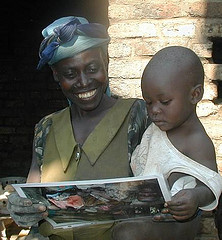
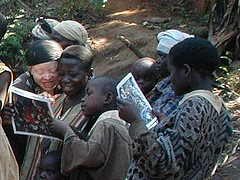
Looking at a picture we took of them on the previous visit
Blogged with Flock
Posted by
Come and See Africa
at
6:57 PM
0
comments
![]() Links to this post
Links to this post
Batwa family from Rwanda
I took this video when I visited Batwa family in Butare Rwanda in 2006. There are 10 families, and about 40 people live in a small small house out skirt of Butare where the Come and See Africa Mission Center is located. Butare is the second largest city in Rwanda and the home of National University of Rwanda where I provide faculty development workshops each summer. We became good friends with them since 2001. Whenever we visit them, we bring goats for them and they greet us with singing and dancing.
Blogged with Flock
Posted by
Come and See Africa
at
6:35 PM
0
comments
![]() Links to this post
Links to this post
I wish I would have entered and won one of these.
There are so many exciting things are happening in education with digital media. Here are samples of the projects that won MacArthur Competition this year. You can read more details about the competition and projects at the MacArthur Foundation site.
"The 2007-08 Digital Media and Learning Competition, administered by HASTAC and supported by the MacArthur Foundation. From a field of over 1,000 applications, seven projects won Innovation awards of $100,000 or $238,000; in the Knowledge-Networking category, ten projects received awards ranging from $30,000 to $72,000. "
Blogged with Flock
Posted by
Come and See Africa
at
6:25 PM
0
comments
![]() Links to this post
Links to this post
